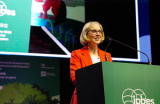
Over 4,500 non-state actors from across the global economy have committed to halving emissions by 2030, joining the UN-backed Race to Zero campaign. These actors from over 92 countries
recognise the value and the imperative of racing to a zero-carbon economy to build a healthier, safer, cleaner, more resilient world for generations to come.
One year since its launch, the campaign has seen a tenfold increase in small and medium-sized enterprises (SMEs), a fivefold increase in the number of financial institutions and now includes 40% of FTSE100 companies, almost 1000 cities and over 600 educational institutions committed to credible climate action. Major new joiners include Google and Microsoft (through Exponential Roadmap Initiative), Apple, Pfizer and ENGIE (through Business Ambition for 1.5C); JLL and Visa (through The Climate Pledge), Minas Gerais through Under2; Nashik through Cities Race to Zero, and many more. See here for a full list of Partners and their members.
Patricia Espinosa, Executive Secretary of the UNFCCC, said: “At COP26 the world must lay the ground for a decade of transformational climate action. What the Race to Zero has shown - in just one year - is that there is unprecedented momentum among non-state actors to achieve that goal and deliver the promise of the Paris Agreement as rapidly as possible.
I applaud the more than 4,500 companies, cities, regions, financial, educational and healthcare institutions that have joined, and urge the rest of the world to join us as we work to halve emissions by 2030."
Non-state actors are already delivering change
With less than five months left until COP26, actors are racing to implement their commitments to provide our best hope of delivering on the promise of the Paris Agreement. Decarbonising as fast as possible is not only a societal obligation, but crucially a commercial expectation and the only future path to growth.
Alok Sharma, COP26 President-Designate, said: "In just over a year, the Race to Zero has become the gold standard for ambitious climate action and I am proud to be joining the UNGC and world leaders to mark this anniversary. We all need to work together to make the necessary changes and we know action from companies encourages bold commitments from countries. This clear display of support for ambitious climate action across the global economy is critical to delivering a successful COP26 and to limiting the global temperature rise to 1.5C.”
Healthcare
- Even despite the Covid-19 Pandemic, over 3,000 hospitals in 37 healthcare institutions are racing to halve emissions by 2030. The Hospital Cliìnica Biìblica in Costa Rica is undertaking a major installation of solar panels on its journey to slash emissions by using renewable energy. As healers, these hospitals know that prevention and preparedness are essential to fighting the climate crisis and that the road to recovery begins with transformative climate solutions.
Businesses
- A sample cohort of companies in Business Ambition for 1.5Ccollectively reduced their annual emissions by 25% between 2015 and 2019 – a difference of 302 million tonnes.
- The 1.5C Supply Chain leadersin the Exponential Roadmap initiative work with their suppliers to reach collective targets and to reduce greenhouse gas emissions through firm action and collaboration. One of them - IKEA - is striving to achieve 100% renewable energy across the IKEA value chain.
- In The Climate Pledge, ITVhelped build the world’s first digital content carbon calculator – DIMPACT – with Bristol University and other media companies. ITV is also the first broadcaster in the UK to commit to 100% of the programs they produce and commission having to achieve Albert certification by 2021. With 206 renewable energy projects across the globe, Amazon is the world’s largest corporate buyer of renewable energy. These projects have the capacity to generate over 8,500 megawatts (MW) and deliver more than 23 million megawatt hours (MWh) of energy annually—enough to power more than 2 million U.S. homes.
- SMEsare also racing ahead, and more than 800 of the over 1,200+ SMEs in Race to Zero through the SME Climate Hub committed to net zero by 2030. Make, an international architectural practice, is focused on reducing the environmental impact of the buildings they create, to enhance passive design, waste reduction and energy performance.
Cities
- Through Cities Race to Zero, Recife, a large city in Brazil, is a pioneer in making education on sustainability and climate emergency compulsory in municipal public schools, as well as being the first Brazilian city to declare a climate emergency.
Bringing this all to life, UK commercial property and investment company - Landsec - is hosting Race to Zero’s birthday video on its famous Piccadilly Lights. Landsec, which manages a portfolio of £10.8 billion, covering 23.5 million sq ft, in 2016 became the first commercial real estate company in the world to have its carbon emission target approved by the Science Based Targets Initiative, and in 2019 it aligned its targets to a 1.5C scenario. As a result, this year it has already reduced its carbon emissions by 42%.
Gonzalo Munoz, Chile COP25 High Level Climate Champion, said: “Our partners and members are racing to halve emissions by 2030. This global coalition of leading initiatives demonstrates the positive impact of radical collaboration and inclusive multilateralism. We are inspired by the change already underway, but this is only the beginning: we all need to keep racing as fast and as far as each of us possibly can.”
Christiana Figueres, Founding Partner of Global Optimism, said: “The Race to Zero is one year old – but decades in the making. We have a once-in-a-lifetime chance right now to realise the goals of the Paris Agreement. To do this we have to act in the present tense, activating every company, city, region, financial institution and individual to seize the achievement of the goal for net-zero emissions in a timely and appropriate fashion. In this decisive decade, the collective force of the growing Race to Zero community is the hope we need.”
Accelerating the transition ahead of COP26
Race to Zero is not an end in itself: the campaign aims to bring together these leading Partner initiatives in order to amplify their voice and activate an ambition loop with national governments to help countries both ratchet and deliver their NDCs.
As the campaign looks to work with the whole climate community and the broader public to support the implementation of these robust commitments, the Champions and Race to Zero Partners warmly welcome you to join them in an opening session to launch the public consultation on the future of Race to Zero.
This session will set out the context and outline the process for the public consultation to shape the future of Race to Zero, seeking to gather feedback on specific themes to continue enhancing the campaign and maximising its impact on limiting emissions. It will explore how to drive cooperation and coordination within the climate action ecosystem to leverage different non-State actors’ capacities and expertise with a view to ensure the implementation of robust climate action based on credible net-zero targets.
Nigel Topping, UK COP26 High Level Climate Champion, said: “Achieving net zero is an issue being discussed by citizens of the world, in articles across the media and in Citizens’ Assemblies across the world. We learn and we succeed by coming together across the global economy and taking action. We call on you to help us shape the future of Race to Zero and to act now towards a healthier, safer, cleaner and more resilient future for the next generations.”
Bridging the gap between mitigation and resilience.
The race to a world in which people can thrive in spite of climate change does not end with climate mitigation. Efforts to reduce emissions must take into account the impacts of climate change we are already feeling, and help reduce them, especially for the most vulnerable. In recognition of this, the Race to Resilience was launched in January 2021 to place adaptation and resilience on equal footing to mitigation, catalysing a step-change in global ambition and action on resilience from non-state actors.
As in the Race to Zero, the non-state actor community is stepping up in this crucial year of climate action to drive more resources to climate resilience and adaptation. Twenty-one non-state actor-led initiatives are now part of the Race to Resilience, with over 1,500 members, operating in over 80 countries across five regions.
Emma Howard Boyd, Global Ambassador for Race to Zero and Race to Resilience, and Chair of the UK Environment Agency, said: “Ahead of COP 26, we need to ensure that the race to net zero runs hand in hand with the race to resilience. Climate shocks like droughts, crop failures and storms affect people’s health, drive inequality and disrupt economies. Preparing for these can provide skills, jobs and opportunities for nature recovery, but resilience to these shocks is still too reliant on the public purse. Unless we change this, the economic recovery we so badly need could melt in a heatwave or wash away in a flood.”
Find out more about all the Race to Zero Partners here, and about the Race to Resilience Partners here.
If you haven’t already, register here for the UN Global Compact Leaders’ Summit, marking the 1 Year Anniversary of the Race to Zero.
About the UNFCCC
With 197 Parties, the United Nations Framework Convention on Climate Change (UNFCCC) has near universal membership and is the parent treaty of the 2015 Paris Climate Change Agreement. The main aim of the Paris Agreement is to keep a global average temperature rise this century well below 2 degrees Celsius and to drive efforts to limit the temperature increase even further to 1.5 degrees Celsius above pre-industrial levels. The UNFCCC is also the parent treaty of the 1997 Kyoto Protocol. The ultimate objective of all agreements under the UNFCCC is to stabilize greenhouse gas concentrations in the atmosphere at a level that will prevent dangerous human interference with the climate system, in a time frame which allows ecosystems to adapt naturally and enables sustainable development. Photo by Cien, Wikimedia commons.








































